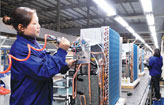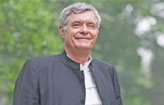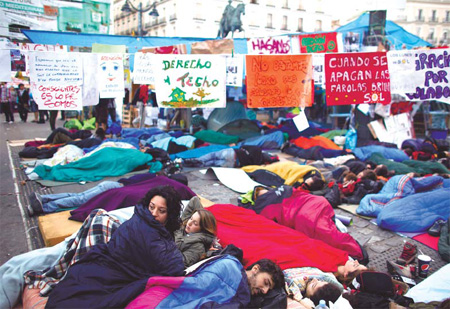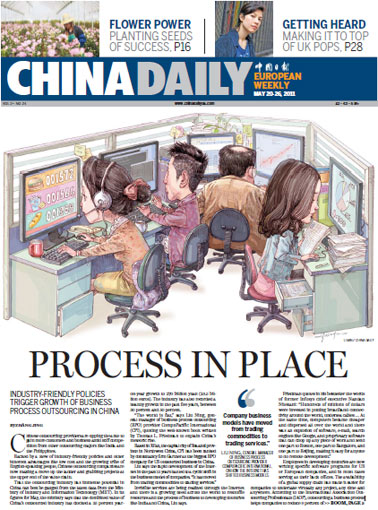Politics
Huge protests overshadow Spanish local elections
Updated: 2011-05-23 08:02
By Daniel Silva (China Daily)
|
Demonstrators camp out in Madrid's Puerta del Sol on Sunday. Tens of thousands of protesters have daily joined those camped out for the past week to protest against government austerity measures before regional elections on Sunday which are likely to deal a blow to the nation's ruling Socialists. Paul Hanna / Reuters |
MADRID - Spaniards voted on Sunday in local elections set to crush the ruling Socialists as protesters fuming over mass unemployment defied a ban on their swelling movement.
Demonstrators, who blame mainstream politicians for a jobless rate of more than 21 percent, refused to budge from a makeshift plastic-covered camp in central Madrid's Puerta del Sol square.
The electoral impact of the protests, which have brought tens of thousands onto the streets since May 15, including an estimated 60,000 nationwide on the eve of the election, was difficult to gauge.
Surveys forecast devastating losses for the Socialists as voters take revenge for the destruction of millions of jobs and painful spending cuts, including reductions to state salaries.
Mostly young protesters have massed in city squares across the country, from Barcelona to the holiday island of Majorca, defying an election commission order that their gatherings are illegal.
"It is time to give other parties, with another vision of how to structure a society, a chance to govern," said 21-year-old anthropology student Carlos Casado as he lined up to get a free breakfast.
Others vowed not to cast a ballot. "I have never voted in my life because I don't see myself reflected in the politicians, I never felt they listen to us," said 20-year-old Javier Pena Pintor.
More than 34 million people are eligible to vote on Sunday, choosing 8,116 mayors, 68,400 town councillors and 824 members of regional parliaments for 13 of the 17 semi-autonomous regions.
The ruling party of Prime Minister Jose Luis Rodriguez Zapatero is forecast to lose control of strongholds such as the cities of Barcelona, Seville and the central region of Castile-La Mancha.
Despite Zapatero's promise not to stand in the next general elections due next year, analysts say his party could be left short of an absolute majority in all the 13 regions up for grabs.
"That citizens can cast their vote freely, individually, is one of the great things about democracy. Once we know the results there will be all kinds of analysis," Zapatero said after voting in Madrid.
Spain's press also urged people to vote.
The conservative daily El Mundo said many young protesters were not alive when Spain transitioned to democracy after the death of General Francisco Franco in 1975.
"Maybe they don't know what it cost to get here. Democracy was a collective achievement of millions of Spaniards and it delivered longed-for freedoms but also the greatest period of development and economic prosperity in history," El Mundo said.
Spain's unemployment rate shot to 21.19 percent in the first quarter of this year, the highest in the industrialized world. For under-25s, the rate in February was 44.6 percent.
Spain is also focused on the northern semi-autonomous Basque Country, where a new political force, Bildu, is fielding candidates after a court battle to prove it is not a mouthpiece for armed separatist group ETA.
Agence France-Presse
E-paper

Thawing out
After a deep freeze in sales during the recession, China’s air conditioner makers are bouncing back
Cool Iron lady
Of good and evil
Build on security initiatives
Specials

Memory lanes
Shanghai’s historic ALLEYS not just unique architecture but a way of life

Great expectations
Hong Kong-born singer songwriter rises to the top of the UK pops.

A diplomat of character
Belgian envoy draws on personal fascination to help build China ties.

